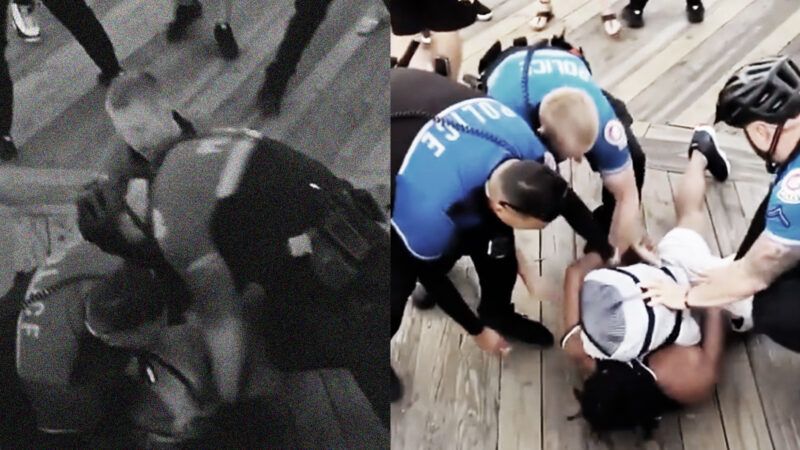Cops Tased and Beat Teens While Enforcing a Local Vaping Ban
Dumb laws lead to police brutality.

Over the last several years, people across the political aisle have conceded that parts of the drug war only serve to exacerbate certain problems. At the same time, politicians of both stripes have engaged in a bipartisan effort to restrict a new bogeyman: vaping.
So they shouldn't be surprised that such restrictions are colliding with overpolicing—one of the most glaring issues with the war on drugs.
On Saturday in Ocean City, Maryland, officers notified "a large group" that their vaping was in violation of a local ordinance that prohibits vaping and smoking except in designated areas. After walking away, cops noticed one of the same teens, Brian Everett Anderson, reengaging with his vape. "Officers approached the group again to further address the violation," reads a press release from the local government. "During the course of the interaction, the male refused to provide his proof of identification and became disorderly."
A viral video making the rounds Sunday appeared to cast some doubt on the idea that the situation merited such force. The clip shows a teen with his hands up, surrounded by Ocean City officers and public safety aides. He is then tased, falls to the ground, and is later hogtied and carried away.
Police in Ocean City Maryland tasered a 17-year-old teenager after they accused him of vaping yesterday. https://t.co/PVzagAV5i1
— Rebecca Kavanagh (@DrRJKavanagh) June 13, 2021
Three other teens—Kamere Anthony Day, Jahtique Joseph John Lewis, and Khalil Dwayne Warren—were also arrested, the government notes, alleging that they, too, engaged in disorderly conduct and tried to disrupt the scene. Additional videos show a group of officers piling on top of one teen while a cop knees him repeatedly in the side.
"Our officers are permitted to use force, per their training, to overcome exhibited resistance," reads the statement from the government. "All uses of force go through a detailed review process. The uses of force from these arrests will go through a multi-level examination by the Assistant Patrol Commander, the Division Commander and then by the Office of Professional Standards."
But what officials in Ocean City appear to miss is that such a scene would not have been possible at all had it not been for the dumb rule they put in place. Legislators need to confront the fact that any law on the books has to be enforced with armed agents of the state.
They are not alone. Former President Donald Trump's administration moved to ban certain electronic cigarette flavors in an effort to curb teen usage; Democrats have not been immune to similar pieces of legislation. The effort is unusually bipartisan, which, if history is any indication, is not a reflection of good policy making, particularly when it comes to moral panics.
The bans are not rooted in science: Vaping has been shown to help smokers quit and provides a safer alternative to cigarettes. But even if that weren't the case, it shouldn't matter in the context of smart rule-making. Time and time again, communities have come up against the collateral damage of the drug war: black markets that incentivize violence, and overpolicing that sees people thrown in cages for making questionable personal choices. No one is asking politicians to morally sanction the use of various substances—we are asking that they live in reality.
This is not the first high-profile example of a law weaponized in a gruesome way. Eric Garner, one of the most well-known victims of police brutality, died after New York City Police Department Officer Daniel Pantaleo choked him for the crime of selling loose cigarettes.
Meanwhile, President Joe Biden is proposing that menthol cigarettes be banned, because they are used disproportionately by black people. In other words, Ocean City's policing gone wrong won't be the last.


Show Comments (71)